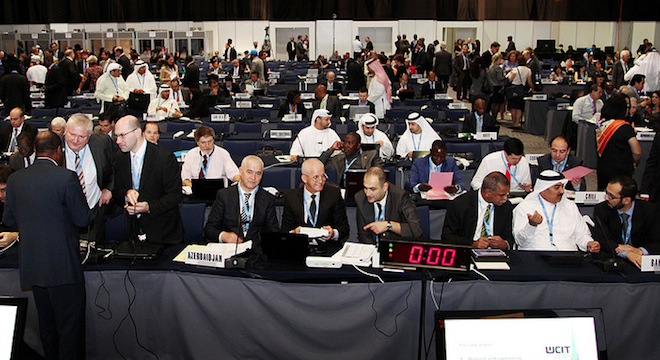The United Nations is not having an especially good week. Aside from watching U.S. Congressional Republicans vote down U.S. ratification of an international treaty meant to protect the rights of those with disabilities (modeled after America’s own laws, no less), another U.N. agency has been busy attempting to counter the narrative that it would takeover the Internet by socially authoritarian-inclined governments.
It’s worth noting the U.N. agency in question, the International Telecommunication Union (ITU), has throughout the better part of 2012 attempted to battle back concerns and criticisms — many coming from U.S. Republicans, Web freedom advocacy groups and now Google.
But the ITU seems to be losing the message war when it comes to the goings-on of the World Conference on International Telecommunications (WCIT-12), a summit involving representatives from all 193 member nations in the U.N., that kicked-off in Dubai on Monday and will run through December 14.
The summit is meeting in order to update a series of international agreements on telecommunications, the International Telecommunications Regulations (ITRs) that were established back in 1988, before the advent of the commercial Internet and its associated services, such as social networking. Back then, world governments were concerned with establishing standards to ensure interoperability of international telephone calls, regulations pertaining to cable TV, and large, public or quasi-public telecos.
The ITU coordinating body, the ITU Secretariat, has argued that there is a need for international work on cybersecurity, among other reasons to update the ITRs to address the Internet. But critics are concerned the whole process is a power grab for the reins of Internet governance, which until now has remained the providence of several technical-minded, non-governmental organizations (W3C, ICANN) located mainly in the U.S. and Europe.
Critics point to the fact that the ITU doesn’t hasn’t historically made most of its documents and proposals for new regulations public, and that discussions on new regulations take place behind closed doors, without press and industry figures.
On Wednesday, the conflicting narratives reached a head when the Center for Democracy and Technology (CDT), a U.S. Web freedom advocacy nonprofit funded by some of the largest tech brands, published an update on the WCIT conference indicating that the ITU’s standards group had, a week prior, adopted a new international technological standard for “Deep Packet Inspection in Next Generation Networks.” The standard would give a green light to internet service providers (ISPs), and presumably governments, examining the content of data sent by users over the Web, including encrypted data. PC World has an excellent layperson’s explanation of deep packet inspection and its legitimate and more Orwellian potential.
That news was reported by several websites as legitimizing invasion of Web user privacy or “eavesdropping,” by world governments.
But the ITU attempted to rebut these allegations, publishing a blog post on Thursday attempting to clarify why the new standard was adopted ahead of the Dubai WCIT-12 summit.
“DPI [Deep Packet Inspection] thus presents a fine-grained, long-term traffic management solution to aid ISPs in contending with volumes of traffic rising at an exponential rate,” wrote the ITU’s communications representative Toby Johnson in the blog post, also adding that “the standard does not allow access to users’ private information and allows measures to ensure the secrecy of correspondence.”
Johnson later expounded upon these explanations in an email to TPM.
“Privacy concerns are what make the headlines but there are perfectly legitimate uses of the technology as outlined in the blog,” Johnson wrote. “As someone has said cars can be used in illegal ways, does that mean that cars should not be built? (Not to mention guns, knives etc.). And of course DPI is used in accordance with national law in a number of countries, including the US.”
Meanwhile, in a semi-ironic twist, the ITU on Thursday acknowledged in a statement that it suffered an unexpected and annoying website outage on Wednesday, which prevented some of the delegates assembled in Dubai from accessing documents necessary for the negotiations to proceed. Though the ITU said it established a work around and has since restored service, it also noted that “hacker groups” had claimed responsibility for the outage, and used the occasion to call for more work on international cybersecurity standards.
Self-identified participants in the hacker movement Anonymous took to Twitter to claim responsibility for the downing of the ITU website, as The Daily Dot reported, and earlier announced what they said was a coordinated campaign of cyber-vandalism against the ITU to protest an Internet governance grab.
With another full work week left in the conference, it remains to be seen whether deep packet inspection is the most controversial aspect of the new ITU Internet stances taken, or whether anything else emerges that further raises Web freedom and privacy advocates’ ire.






